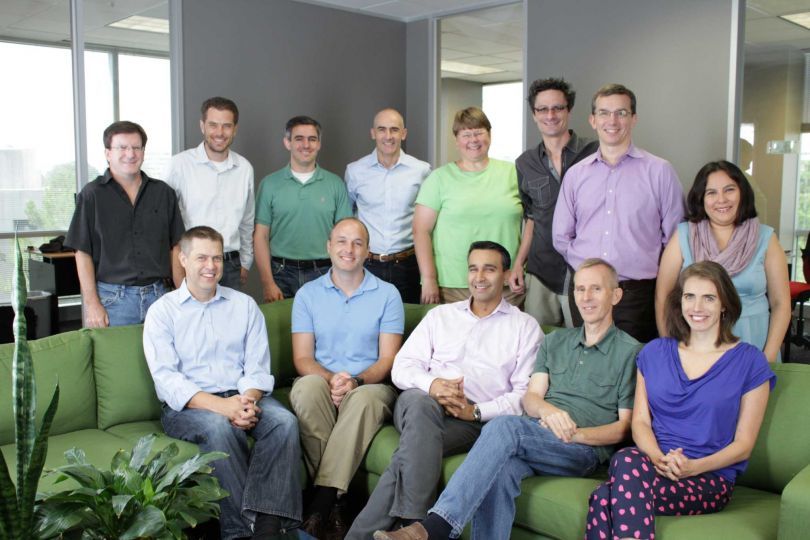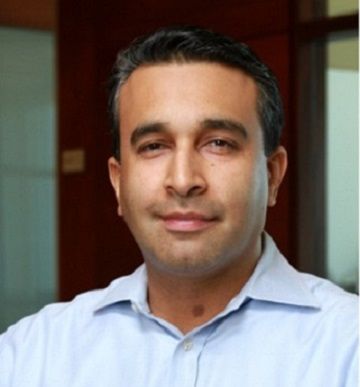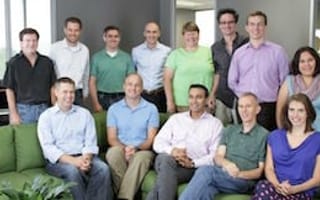
Bhagat (pictured front right center) with the rest of the TrustRadius team.
Our Serial Entrepreneur Series sponsored by IBM is a personal look into what it takes to spearhead multiple companies here in Austin. For the first installment of the series, we were lucky enough to sit down with
founder and CEO, Vinay Bhagat.Originally from the UK, Bhagat moved to the U.S. after graduating from The University of Cambridge in 1992. He then received his MS from Stanford University while working as a consultant for Bain & Company, followed by a stint at Harvard where he earned his MBA.
In 1998 he was hired by Austin-based
, where he spent less than a year before creating his first company, Convio. In 1999 he founded Convio, a leading SaaS provider of online fundraising and advocacy solutions. He ran Convio as CEO for four years then assumed the role of CSO until the company exited in 2012 for $325 million.Now leading his second Austin-based startup, TrustRadius – the trusted platform for business software reviews, Bhagat spoke with us about his entrepreneurial beginnings and the obstacles he's faced in his journey:
Many people realize they have an entrepreneurial spirit at a very young age. Was that the case for you?
When I was 12 or 13 I had my first inkling that I really wanted to be an entrepreneur. My dad was a designer for the Ford Motor company but ran a small business on the side. He used to go to London to buy products like jeans and watches and sell them at his office. His side business actually made more money than his day job. Then he developed a network of people who would sell for him, so I got to witness that first hand and went to London a lot to help him out.
I also had my own entrepreneurial endeavors. I was really into hard rock and heavy metal at the time and I knew all of the bands my friends were into and, on the weekend, I would troll record bins to find stuff on sale and go sell at mark-up to kids at school. For a teenager, it was a fairly lucrative mini-business selling rock records.
I always had that DNA and entrepreneurial instinct. But then I followed a very safe path for a number of years — I went to the right universities and worked at Bain (the consulting firm), which was a stable, blue chip thing to do. But I always, in the back of my mind, wanted to do something more entrepreneurial. One of my idols growing up in the UK was Richard Branson, the founder of Virgin, and I always wanted to be kind of like him but didn’t have the guts to go down that path until much later on in life.
What was that moment that made you give into that instinct?
After graduating from Harvard Business School I came down to Austin because I was recruited by Trilogy Software. It was an environment full of bright, intense people but I didn’t really feel it was the right environment for me. I didn’t see eye-to-eye with the CEO and he fired me.
That was probably the best thing that could have ever happened to me because that was the kick in the butt I needed to actually take the risk and go and do something entrepreneurial. I had, at the time, a very low burn rate — no kids, my wife was working and we were living in an apartment. This was during the entrepreneurial frenzy around the DotCom period, these factors all coalesced and allowed me to start my first company.
Did you know you would eventually create another company after Convio?
I don’t know if I knew how successful it would be and honestly it ended up being a pretty long journey (about 13 years end-to-end). Along the way, I started to get itchy and wanted to do something, feeling like I needed a new challenge. And I think at that point I really understood that I wanted to do something new entrepreneurially. But it all depends — sometimes you can land on something that is your life’s work. But until you're into it, it’s hard to know whether the business your working on is your life’s work or just a stepping stone.
What different strategies did you adapt between your first and second company?
I founded Convio in 1999 at a time when it was relatively easy to raise venture capital. Money was flying and I was also 28 or 29 years old and relatively inexperienced, so I learned a lot the first time around.
 In hindsight, as I look back upon that experience, I made a number of mistakes in execution. I tried to scale faster than the market was maturing and ultimately had to do a reduction in force a couple of years in to resize the company and restart on the right growth trajectory. I also always felt we could have been better at building a more capital efficient model in the business earlier on and working harder on that. Because once you get into scale mode, it’s really hard to go back and re-engineer costs out of the system. And some of the decisions I made about people early on, in terms of my early hires weren’t all spot on.
In hindsight, as I look back upon that experience, I made a number of mistakes in execution. I tried to scale faster than the market was maturing and ultimately had to do a reduction in force a couple of years in to resize the company and restart on the right growth trajectory. I also always felt we could have been better at building a more capital efficient model in the business earlier on and working harder on that. Because once you get into scale mode, it’s really hard to go back and re-engineer costs out of the system. And some of the decisions I made about people early on, in terms of my early hires weren’t all spot on.
So in starting TrustRadius, I realized that, as an entrepreneur, my most precious asset is actually my time and I wanted to make sure that we were truly onto a great idea before I raised capital because once you raise capital, you pretty much commit yourself to a path. You can shift direction to a degree but you’re committed.
We bootstrapped the company for nine-plus months with just a team of three people incubating an idea and vetting it by running a private beta before attempting to scale and raise our Series A. So that was one fundamental difference: making sure that we had landed on something that had legs to be a large scale business.
We still run the company very frugally. We only have 17 people on the team, even though our site ,TrustRadius.com drives 250,000 monthly unique visitors – professionals researching business software before they buy. It’s a very efficient, lean operation..
Another key difference is that I’m simply more experienced than when I founded Convio. I’m more savvy in terms of what to look for in individuals and especially my management team. This time around, we’re making sure every hire we make is a “must hire." Sometimes you have to grow slower at the beginning to grow faster later.
Were there any key players from your days building Convio that were brought to TrustRadius?
I’ve got three folks from Convio that joined me for different parts of the business. One of the first people to join the team is a guy who worked as my strategy analyst at Convio and and came on board as my Director of Research. The top engineer from Convio joined our team as well and is a huge contributor. My head of Customer Success also joined from Convio where he ran a similar program. He was one of our star performers at Convio too. My original co-founder was our CTO at Convio and made an enormous impact in building our platform but has since returned back to the nonprofit sector which is his real passion.
Hiring people that had worked with me before was one way of avoiding mistakes but more importantly I had new judgment of what to look for in people. It’s all about who you want on the journey with you, what skills you want them to bring and the cultural fit dimensions that are critically important.
What technological lessons-learned helped you build TrustRadius in a smarter way?
The problem that we are addressing is that if you are a buyer of technology, there are few places to go for authentic advice. I thought that was crazy because if you’re a consumer booking a hotel or selecting a restaurant, there are several trusted places to go to get very detailed advice. And at my last company, in our last two years before being acquired, we bought about 30 different enterprise systems and it was always a struggle to get good intelligence to make good decisions, we were far too reliant on what the salesperson had to say.
When I asked my team at Convio and network what the most desired way to get product intelligence was, they said to speak to peers, but most people have pretty finite social networks that you can’t really tap for extensive business software insights. Application software alone is a $500 billion space yet the level of information transparency in this market was far behind what we were experiencing as consumers.
TrustRadius is a network based business. We had to first build out a critical mass of useful user generated content and a content generation machine. We then had to establish influence and an audience before we could even think about monetizing. Consequently, it was essential to keep our burn rate low during this critical foundation building period.
For a traditional SaaS business, you don't have to follow the same path that I followed, you can start by getting a V1 product to market as soon as possible and get beta customers at low revenue and increase the value of your product.
We made the requisite investments in technology like a CRM, a marketing automation platform and AB testing platforms, but have been judicious about how we add technologies based on the phase of our business. We’ve bought additional services as we’ve entered different milestones or our scaling.
What are your thoughts on the ever-growing entrepreneurial community and what advice would you give to any aspiring entrepreneurs?
I think entrepreneurship is one of the most gratifying yet challenging things you can do in life. I would dissuade anyone for attempting to go down this path but they have to be doing it for the right reasons. It’s by no means the easiest way to make money. That's not the reason to be an entrepreneur. If you just run the probabilistic odds, its actually an inferior way to make money than many other forms of work.
You do this because you simply can’t do anything else. I can’t imagine just working for someone else’s company. I love the creative process of taking a raw idea and making it into something real and tangible, building a team around it, bringing a product to market, selling customers on a vision, and seeing customers realize success. If you’re lucky and you land on the right product opportunity at the right time, really interesting things can happen — you can build a market and change an industry. I was very fortunate to do that with Convio. We changed the way nonprofits raised money, directly employed 450 people, created 1000s of jobs nationwide, and had a $325 million exit.
But it’s not a get rich quick scheme — it’s really, really difficult. You will have massive ups and downs and you will need to be able to lead through challenges. If you can be successful, it’s extremely gratifying.
And ideas are a dime a dozen. I often hear of first time entrepreneurs being super protective about their ideas. It’s not about the idea itself, it’s about the execution.
IBM Global Entrepreneur is a startup program that gives founders and developers access to big-company resources — for free. Want to learn more? Email Meagan.
Responses have been edited for length and clarity.





